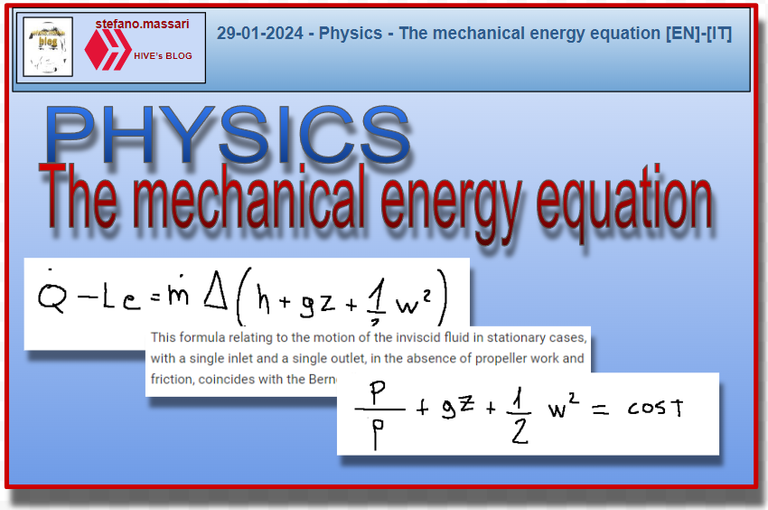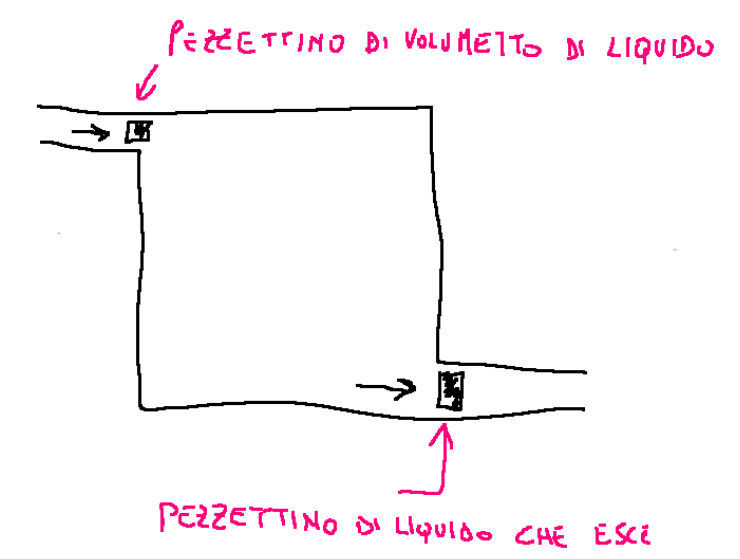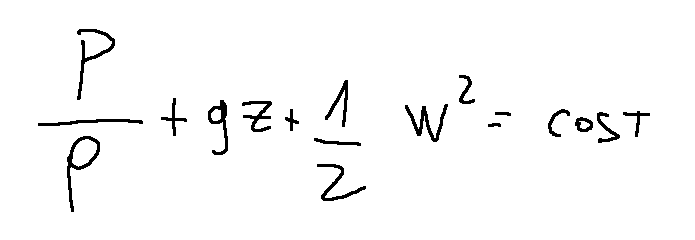
~~~ La versione in italiano inizia subito dopo la versione in inglese ~~~
ENGLISH
29-01-2024 - Physics - The mechanical energy equation [EN]-[IT]
The mechanical energy equation
Basic concepts
For the topic in question it is good to know that the first law of thermodynamics for open systems establishes that the energy associated with a control mass (M.C.) can vary over time due to two different types of energy flows:
-Thermal power
-Mechanical power
Instead, the second law of thermodynamics for open systems states that the entropy associated with a control mass can vary due to entropic flow and entropy production.
Summing up:
The first law of thermodynamics on open systems speaks of the energy associated with the control mass, while the second law speaks of the entropy associated with the control mass.
The mechanical energy equation
Let's always imagine we have the following system

The first law of thermodynamics for open systems
The first law of thermodynamics for open systems in steady state conditions is as follows

Mechanical energy equation
The mechanical energy equation can be derived from the formula expressed above and is as follows.

Where:
Le = propeller mechanical power. That is, the work exchanged between system and environment through the use of a rotating shaft.
R is a term related to internal energy production
Now let's assume that:
ρ = const, i.e. the flowing medium is also a perfect liquid.
L e is equal to zero (L e = 0), this would mean that there is no organ that transfers work in the system.
R= 0, i.e. there is no friction between the fluids and the walls of the system.
At this point we obtain the following formula:

This formula relating to the motion of the inviscid fluid in stationary cases, with a single inlet and a single outlet, in the absence of propeller work and friction, coincides with the Bernoulli equation.
Conclusions
By adding particular conditions to the mechanical energy equation, we can derive a formula that coincides with the Bernoulli equation relating to the motion of a fluid.
Request
Do you remember studying these concepts at school? These are concepts that are not always taught in schools.

29-01-2024 - Fisica - L’equazione dell’energia meccanica [EN]-[IT]
L’equazione dell’energia meccanica
Concetti base
Per l'argomento in questione è bene sapere che la prima legge della termodinamica per i sistemi aperti stabilisce che l'energia associata ad una massa di controllo (M.C.) può variare nel tempo a causa di due differenti tipi di flussi energetici:
-Potenza termica
-Potenza meccanica
Invece la seconda legge della termodinamica per i sistemi aperti stabilisce che l'entropia associata ad una massa di controllo può variare a causa del flusso entropico e della produzione di entropia.
Riassumendo:
La prima legge della termodinamica sui sistemi aperti parla dell'energia associata alla massa di controllo, mentre la seconda legge parla dell'entropia associata alla massa di controllo.
L’equazione dell’energia meccanica
Immaginiamo sempre di avere il seguente sistema

La prima legge della termodinamica per i sistemi aperti
La prima legge della termodinamica per i sistemi aperti in condizioni stazionarie è la seguente

Equazione dell’energia meccanica
L’equazione dell’energia meccanica può essere derivata dalla formula espressa sopra ed è la seguente.

Dove:
Le = potenza meccanica d’elica. Cioè il lavoro scambiato tra sistema e ambiente attraverso l’utilizzo di un albero rotante.
R è un termine legato alla produzione di energia interna
Ora ipotizziamo che:
ρ = cost, cioè il mezzo che fluisce è anche un liquido perfetto.
L e sia uguale a zero (L e = 0), questo significherebbe che non c’è alcun organo che trasferisce lavoro nel sistema.
R= 0, cioè che non ci sono attriti tra i fluidi e le pareti del sistema.
A questo punto otteniamo la seguente formula:

Questa formula relativa al moti del fluido non viscoso nei casi stazionari, con un solo ingresso ed una sola uscita, in assenza di lavoro d’elica e di attriti, coincide con l'equazione di Bernoulli.
Conclusioni
Aggiungendo delle condizioni particolari all'equazione dell'energia meccanica, possiamo ricavare una formula che coincide con l'equazione di Bernoulli relativa al moto di un fluido.
Domanda
Questi concetti ricordate di averli studiati a scuola? Sono concetti che non sempre vengono insegnati nelle scuole.
THE END



